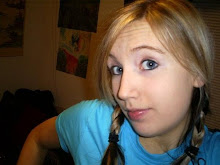Saturday, April 18, 2009
Connections between "The Pacific Era has Arrived" and "Dear Miye"
- Japan's Ministry of Education's 1932 directive that ordered Nisei to "be 'treated as Japanese citizens.'" probably had something to do with Mary's proclamations in one of her letters that said Japan welcomes foreigners. Seems here that Japan's propaganda is working on Mary...
- The essay stated that Waseda International Institute, one of the school's Mary attended while in Japan, was composed mostly of the "elite" Nisei. It is interesting to think of Mary, our beloved narrator (at least beloved by me) as an elitist. This forces me to see a different side of Mary, a side that points to the passages where she writes about how she's never been a victim of racial discrimination in America and her parents were farm owners. This puts me in a similar position as I felt while reading Bookseller when I begin to doubt the overall accuracy of these lifestyles because the stories I read about them contain people exempt from the majority.
- When I read that "a vast majority of students did not partake in the decision-making process" concerning their study in Japan, I immediately thought back to the wire Mary's parents sent her a wire telling her to stay in Japan. Mary was concerned about it for a few days, thinking something terrible had happened, when all along they just wanted her to stay to study more. I thought this was a rash and controlling move on Mary, since she states clearly in her previous letters, she wanted to go home.
Did you guys find any other connections?
Sunday, April 12, 2009
Why Seierstad's bias doesn't matter
In her forward, Seierstad claims the reason she wrote her book was because a family she met in
The topic of Bookseller also brings Seierstad’s objectivity into the spotlight. Because she is a Caucasian woman writing about an Afghan family, her inaccuracies about the actual happenings of the family are highlighted and labeled as racist. In an article in The Los Angeles Times, Shah Muhammad Rais said Seierstad came to
The journalist’s duty of objectivity is difficult to maintain. Asne Seierstad realizes it is something she does not want included in The Bookseller of
Works Cited
King, Laura. "The Bookseller of Kabul responds." Los Angeles Times 25 Feb 2009 1. Web.12 Apr 2009.Seierstad, Asne. The Bookseller of Kabul. New York: Back Bay Books, 2002. Print.
Wednesday, April 1, 2009
An introduction
Now, on to my blog.
Growing up as the daughter of a working mother, I've always been a feminist. But as a student in the second most diverse public school in northeastern Ohio, I've also been accepting of different ways of living. (It's Twinsburg, the school I went to, by the way. Our Vice Principal once stated my previous statistic during an announcement, but I cannot vouch on it's actual validity.)
So when I learned of the treatment of women in the Middle East, I was constrained. To me, the blatant sexism of the culture is unacceptable and intolerable. However, I knew it's a part of their culture and something Middle Eastern women have dealt with for generations. I assumed that, with a few exceptions, the women just put up with it and lived subservient to men.
By reading Bookseller, however, I see that this is not the case in modern Afghanistan. Though I am still outraged of the severe objectification of women in the country, I am proud to see many women are not subservient, and realize they have a right to live freely like men. My favorite feminist in the book is Bibi Gul. Even as an elder, she still is fervent to make sure Shakila is still able to work when she is married.
I picked Bibi as my favorite over, say Suhaila Seddiq, because even though she was courageous and strong for what she did, Bibi is making small progress in a country where many of it's inhabitants don't want to see change at all. I like her especially because she is elderly and from a generation one would not expect women to speak out. Bibi is a surprise feminist who cares not only about the rights of herself, but her fellow females.
